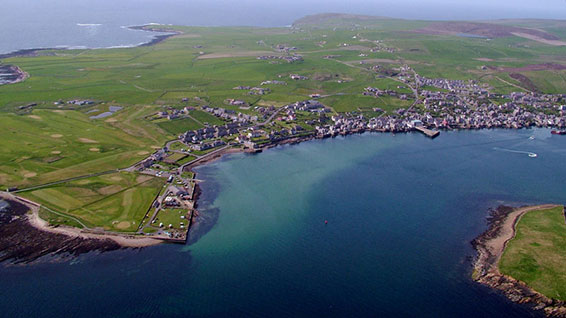Published:

Heriot-Watt University is the only academic partner involved in the first phase of a new £28.5 million project to create a Virtual Energy System (VES) in Orkney.
The ReFLEX (Responsive Flexibility) Orkney project has been launched to digitally link distributed and intermittent renewable generation to flexible demand and storage.
The first-of-its-kind system will interlink local electricity, transport, and heat networks into one controllable, overarching system with Heriot-Watt having a strategic role in providing its expertise in Whole System design and modelling.
The project aims to create a 'smart energy island', demonstrating the energy system of the future, which will reduce and eventually eliminate the need for fossil fuels.
The project is funded by UKRI through the Industrial Strategy Challenge Fund.
Principal Investigator at Heriot-Watt University, Professor David Flynn, said: “The only way to deliver an affordable, resilient and sustainable energy service to society is through an integrated whole systems approach. To understand the complexities across our critical infrastructure and to deliver demonstrable solutions, such research must happen in communities. The Orkney community is a global leader in energy innovation and this project has the potential to deliver a global impact to our low carbon objectives and also provide UK companies and communities with first mover advantage.”
Led by the European Marine Energy Centre (EMEC), the ReFLEX Orkney project brings together an expert consortium of Orkney-based partners – Solo Energy, Aquatera, Community Energy Scotland, Orkney Islands Council and Heriot-Watt – as well as multi-national energy company Doosan Babcock.
Electricity, transport and heat powered by local renewable energy generation, will be coupled with flexible energy demand balancing the intermittency of renewables.
At the heart of the project is the demonstration of flexible energy balancing technologies. For example, the project aims to deploy:
- Up to 500 domestic batteries;
- Up to 100 business and large-scale batteries;
- Up to 200 Vehicle-to-Grid (V2G) chargers;
- Up to 600 new electrical vehicles (EVs);
- An island community-powered electric bus and e-bike integrated transport system;
- Up to 100 flexible heating systems; and
- A Doosan industrial-scale hydrogen fuel cell.
Solo Energy will implement their FlexiGrid software platform enabling smart monitoring and control of the flexible technologies to charge during periods of peak local renewable generation, and release stored energy during times of peak demand.
These technologies will be introduced under attractive leasing type finance and novel ways of ownership that avoid the end user requiring major capital investment.
This pioneering project will help Orkney maximise the potential of its significant renewable generation capabilities, help to ensure higher quality and more affordable energy services, as well as further lowering the county's carbon footprint by decreasing reliance on imported carbon-intensive grid electricity from the UK mainland.
Once demonstrated and proven in Orkney, it is expected that the VES model and associated integrated energy service supply framework will be replicated in other areas across the UK and internationally, building long term export opportunities for the ReFLEX project partners and helping to create more flexible and renewable-based energy systems.
Professor Edward Owens, Director of Heriot-Watt's Energy Academy, said: “ReFLEX is another example of the critical mass Heriot-Watt has, in multidisciplinary research aligned to the whole system energy agenda. Expertise from across our research institutes and learning from our strategic national and global research programs in energy system integration, will support ReFLEX in delivering on its ambitious objectives.”
Professor Richard A. Williams, Principal and Vice-Chancellor of Heriot-Watt University, said: “Our Orkney campus is a wonderful example of academics and students taking a collaborative approach across sectors to create and share new knowledge. The campus regularly engages with local community as well as with industry to develop innovative solutions designed for use in today's modern world.
“The island itself is a world leader in both the quantity and diversity of renewable energy infrastructure it has deployed, in the past 20 years, and it offers an ideal environment to create an integrated and truly smart, future energy system.”
ReFLEX builds on Heriot-Watt University's critical mass in national and international energy system research. The University has an international reputation in embedded intelligence in energy systems and on delivering large scale and complex multidisciplinary projects.
These include ORCA, HOME Offshore, the Heriot-Watt Smart Systems Research Group and the Heriot-Watt Energy Academy.